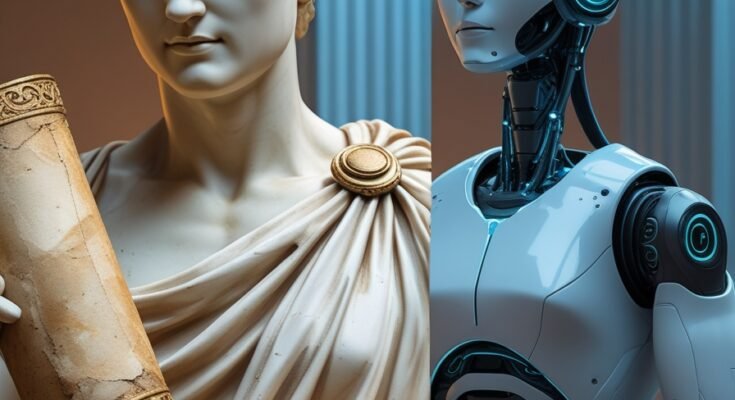The Future of Philosophy: Bridging Ancient Wisdom and Tomorrow’s Challenges
Philosophy, the timeless pursuit of understanding existence, consciousness, and ethics, has shaped human thought for millennia. While today’s world dazzles with scientific breakthroughs and digital innovation, philosophy remains the compass guiding us through humanity’s most profound questions. From Socrates to AI ethics, let’s explore how philosophy has evolved—and why it’s more vital than ever in navigating our uncertain future.
The Roots: How Philosophy Built Civilization
1. Greek and Roman Foundations
Ancient Greek thinkers like Plato and Aristotle asked, “What is the nature of reality?” Their exploration of logic, ethics, and metaphysics laid the groundwork for Western thought. Meanwhile, Roman philosophers like Seneca emphasized virtue and resilience, themes that still resonate today.
2. Islamic Golden Age: Where Faith Met Reason
Medieval Islamic scholars such as Ibn Rushd (Averroes) and Al-Ghazali bridged theology and rationality. Their debates on reason versus revelation preserved classical knowledge and fueled Europe’s Renaissance, proving philosophy’s power to transcend cultural boundaries.
3. The Enlightenment: Dawn of Modern Thought
Descartes’ “I think, therefore I am” shifted focus to human consciousness. Kant and Hegel later dissected morality and history, framing questions about freedom and progress that still dominate political and ethical discourse.
Philosophy Today: Tackling Tech, Ethics, and the Planet
1. Science vs. Consciousness
Neuroscience and AI are rewriting age-old questions: Can machines possess consciousness? Is the mind merely a biological algorithm? Philosophers collaborate with scientists to explore the ethics of brain-computer interfaces and artificial general intelligence.
2. Digital Age Dilemmas
Social media, surveillance, and data privacy force us to rethink autonomy. Should algorithms dictate justice? Can virtual identities harm our humanity? Philosophy’s role in shaping digital ethics is now critical—think of it as the “user manual” for the tech revolution.
3. Environmental Ethics
Climate collapse demands a new moral framework. Philosophers like Val Plumwood challenge anthropocentrism, urging us to redefine humanity’s relationship with nature. Concepts like “ecological justice” are no longer abstract—they’re survival strategies.
Tomorrow’s Frontier: Philosophy in the Age of AI and Interstellar Exploration
1. AI and the Question of Rights
As robots evolve, so do ethical quandaries: Should a self-driving car prioritize passengers or pedestrians? Can an AI “artist” hold copyright? Philosophy will shape the laws governing synthetic minds and their role in society.
2. Cosmic Philosophy
Space colonization and multiverse theories stretch our existential horizons. Will humans on Mars develop new ethical codes? Could alien life redefine “personhood”? Philosophy will grapple with humanity’s place in a potentially infinite cosmos.
3. Reinventing Society
Automation threatens jobs, while VR blurs reality. Philosophers must answer: How do we ensure equity in a post-work world? Can virtual communities foster genuine connection? The answers will define tomorrow’s social contracts.
Why Philosophy Isn’t Going Anywhere
Far from being obsolete, philosophy is the ultimate tool for future-proofing humanity. It challenges us to question assumptions, empathize across divides, and imagine better worlds. As AI accelerates and climate crises escalate, philosophy’s critical lens will help us discern not just what we can do, but what we should do.


